A significant number of homeowners dream of elevating their outdoor spaces by adding vibrant greenery, especially through the installation of stylish pergolas. While earlier discussions covered the best flowering plants ideal for enhancing pergolas, this article takes an intriguing turn by diving into the art of growing delicious fruits!
Integrating fruiting vines into your pergola not only creates a welcoming shaded outdoor area perfect for relaxation and social gatherings but also offers the joy of savoring fresh, homegrown fruit. In the subtropical climate of Brisbane, a multitude of fruiting vines thrive, providing delicious harvests that beautify your backyard with exquisite natural greenery and refreshing shade, transforming your outdoor space into a tranquil oasis.
It’s vital to recognize that not all fruiting vines are appropriate for pergolas. Some varieties, such as kiwi vines, necessitate a robust structure to accommodate their heavy growth patterns, while others, like passionfruit, grow rapidly and require consistent pruning to maintain their shape and overall health.
Below is an extensive guide detailing the top fruiting vines particularly suited for pergolas in Brisbane, including their growing requirements and essential tips to ensure that healthy, productive plants flourish in your garden.
1. Passionfruit (Passiflora edulis) – Your Best Bet for Pergola Beauty and Fruitfulness
Ideal for: Brisbane gardens, rapid growth, delightful fruit production, and creating pollinator-friendly environments
Passionfruit is a standout choice for draping over a pergola, showcasing lush green foliage, striking purple and white flowers, and sweet, tropical fruit that tantalizes the palate. This fast-growing tendril climber can envelop a pergola entirely within a single growing season, providing a swift enhancement to your outdoor aesthetic.
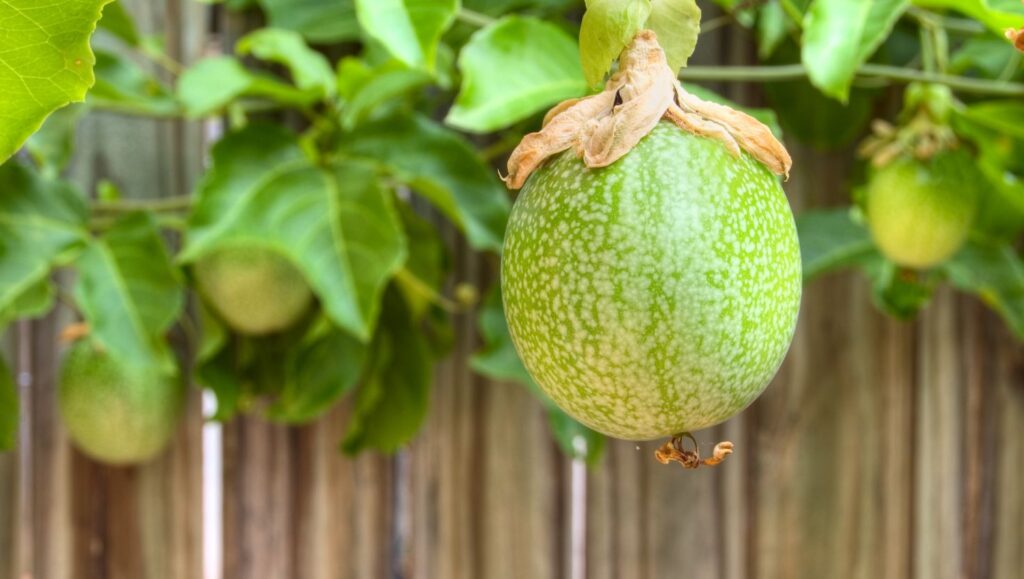
Crucial Growing Conditions for Flourishing Passionfruit Vines
- Sunlight: Requires full sun exposure, meaning at least 6 hours of direct sunlight each day to achieve optimal growth
- Soil: Prefers well-drained, slightly acidic soil with a pH level between 6.5–7.5, enriched with nutrients for the best results
- Watering: Needs deep watering 2–3 times weekly, especially during dry spells, to maintain consistently moist soil
- Fertilizing: A high-potassium fertilizer is recommended every 4–6 weeks throughout the growing season to enhance productivity and fruit yield
- Pruning: Regular pruning post-fruiting is essential to encourage new growth and prevent excessive overgrowth
Top Passionfruit Varieties Perfectly Suited for Brisbane Gardens
- Nellie Kelly (Grafted Purple Passionfruit) – Renowned for its impressive disease resistance and exceptional productivity
- Panama Red & Panama Gold – Produces larger fruit, is heat-tolerant, and thrives remarkably well in subtropical conditions
- Sweet Granadilla (Passiflora ligularis) – Offers aromatic fruit but prefers slightly cooler temperatures for optimal growth and flavor
Expert Tips for Successfully Growing Passionfruit Vines on a Pergola
- Train young vines along the pergola beams to promote uniform growth and coverage across the structure
- Regularly prune excess growth to improve airflow and sunlight penetration, which is vital for the health of the vines
- Plant near a fence or trellis to provide additional support, ensuring the vines have a strong structure to climb
2. Kiwi Fruit (Actinidia deliciosa) – A Sturdy Climber Demanding Robust Support Structures
Best for: Large, robust pergolas designed to withstand the weight of substantial growth
Kiwi vines are celebrated for being vigorous and heavy growers, necessitating a very sturdy pergola to adequately support their weight. As deciduous plants, they shed their leaves in winter, allowing sunlight to filter through when shade is less critical, making them an excellent choice for year-round gardening.
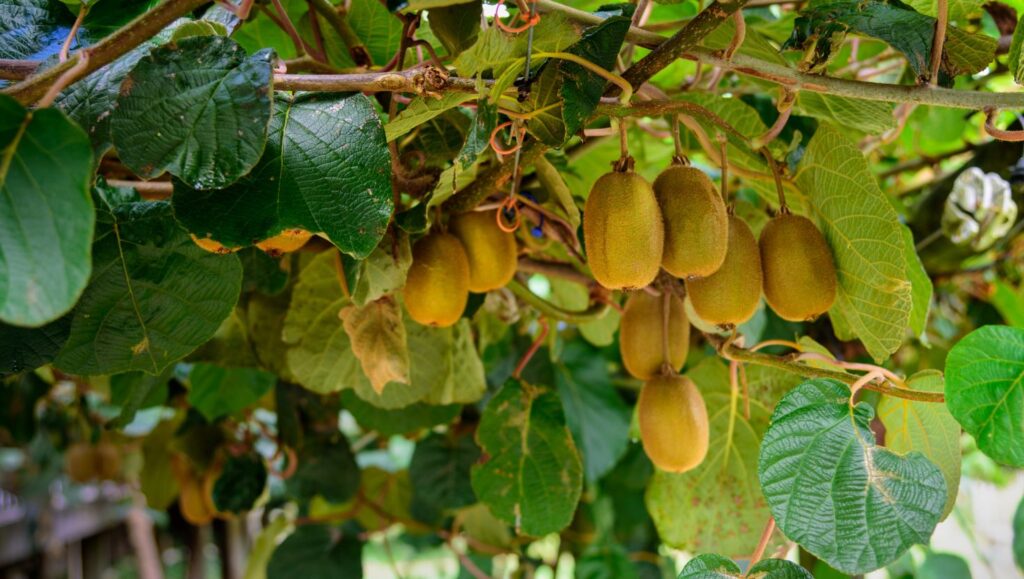
Key Growing Conditions for Optimal Kiwi Fruit Production
- Sunlight: Thrives in full sun exposure, ensuring it receives ample light for healthy growth
- Soil: Requires well-drained, fertile soil enriched with compost to support vigorous growth
- Watering: Needs regular watering, particularly during dry spells, to prevent stress on the plant
- Fertilizing: Application of organic compost and slow-release fertilizer in spring will nourish the plant and enhance its output
- Pruning: Regular pruning is essential to effectively manage growth and improve fruit yield
Understanding Kiwi Pollination Needs for Successful Fruiting
Kiwi vines are dioecious, meaning they possess distinct male and female plants. To ensure fruitful pollination and successful fruiting, it is crucial to have at least one male plant for every 4–5 female plants, promoting optimal pollination rates and maximizing fruit production.
Best Kiwi Varieties for Brisbane's Climate and Conditions
- Hayward Kiwi – The most popular variety, needing a male pollinator for fruit production to occur successfully
- Bruno Kiwi – Recognized for its early fruiting and vigorous growth, making it a favorite among gardeners
- Issai Kiwi – A self-pollinating variety, ideal for smaller gardens with space limitations and an excellent choice for beginners
Effective Strategies for Growing Kiwi Fruits on a Pergola
- Install strong wooden or steel support beams to accommodate the vine’s weight, ensuring safety and stability for the structure
- Space vines at least 3–4 metres apart to allow for adequate spread and airflow between the plants, promoting healthy growth
- Regular pruning is necessary to manage excessive growth effectively, keeping the vines healthy and productive
3. Grapes (Vitis vinifera) – Add Mediterranean Charm to Your Pergola
Best for: Traditional garden pergolas that provide shaded outdoor dining and relaxation experiences
Grapes serve as a fantastic option for pergolas, offering dense shade during the sweltering summer months, while allowing sunlight to filter through in winter when they shed their leaves. They require seasonal pruning but are generally considered low-maintenance once established, making them an appealing choice for many gardeners.
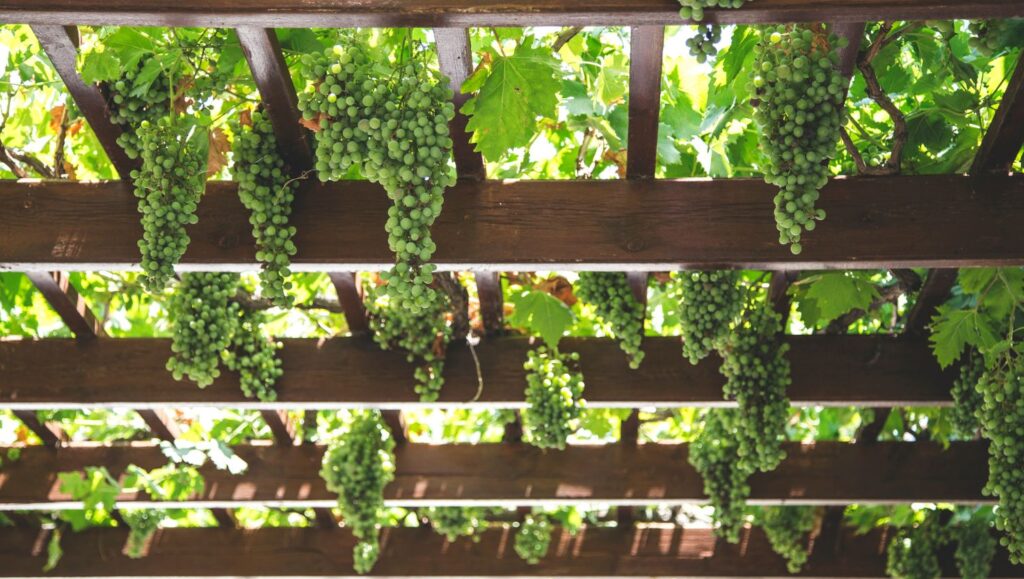
Optimal Growing Conditions for Thriving Grape Vines
- Sunlight: Requires full sun, ideally a minimum of 6 hours of sunlight daily to ensure healthy growth throughout the season
- Soil: Prefers well-drained sandy or loamy soil that supports root health and prevents waterlogging
- Watering: Needs deep watering weekly during dry periods to maintain moisture levels and promote vigorous growth
- Fertilizing: Application of organic mulch and balanced fertilizer in spring is beneficial for nutrient uptake
- Pruning: Essential for removing excess wood and promoting fruit production, ensuring the vines remain healthy and productive
Best Grape Varieties for Gardens in Brisbane
- Flame Seedless – Known for its sweet red grapes, perfect for fresh consumption and snacking
- Sultana (Thompson Seedless) – Ideal for fresh eating or drying, providing versatility in the kitchen for various recipes
- Black Muscat – Produces large, juicy fruit with a rich flavor, excellent for crafting dessert wines and enhancing culinary experiences
Expert Tips for Successfully Cultivating Grapes on a Pergola
- Prune annually to maintain shape and promote fruiting spurs for maximum yield and health
- Train vines along pergola beams to achieve uniform coverage and support for healthy growth and easier harvest
- Utilize netting to protect fruit from birds during the ripening season to ensure a successful harvest and minimize losses
4. Choko (Sechium edule) – A Rapidly Growing, Low-Maintenance Climbing Vine
Best for: Gardeners seeking low-maintenance options and rapid coverage for their outdoor pergolas
Choko (also known as chayote) is a fast-growing vine that produces abundant pear-shaped fruit. It requires minimal maintenance and can effectively cover a pergola within just a few months, making it an excellent choice for creating inviting shady areas. Be cautious not to confuse it with the “moth plant,” which is a different species altogether.
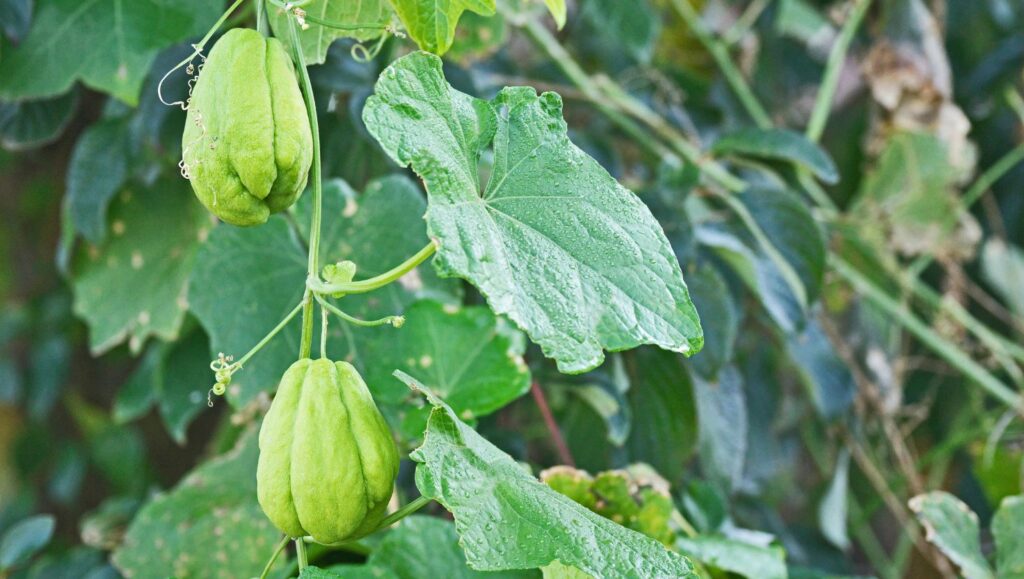
Optimal Growing Conditions for Choko to Flourish
- Sunlight: Thrives best in full sun to partial shade, adapting well to various light conditions for optimal growth
- Soil: Requires well-drained, compost-enriched soil that promotes healthy root development and nutrient uptake
- Watering: Needs regular watering during dry months to keep the plants adequately hydrated and thriving
- Fertilizing: Benefits from organic compost and seaweed-based fertilizers to enhance overall growth and fruit production
- Pruning: Regular trimming is necessary to control growth and maintain a desirable shape for aesthetic appeal
Expert Tips for Successfully Growing Choko on a Pergola
- Choko vines tend to spread quickly, so be prepared for frequent pruning to maintain control over their growth and ensure they don’t overwhelm other plants
- Fruits grow on long tendrils, making them easy to spot and harvest when ripe, ensuring a bountiful yield
- This vine can tolerate drier conditions, making it a suitable choice for Brisbane’s climate, where water conservation is beneficial
Understanding the Key Differences: Moth Plant vs. Choko
Many gardeners in Brisbane cultivate choko (Sechium edule) as an easy-to-manage vine for edible fruit and rapid pergola coverage. However, some may mistakenly grow the moth plant (Araujia sericifera), which is a toxic, fast-spreading vine native to South America and identified as an invasive weed in Queensland. Initially introduced as an ornamental plant, it has since become a significant pest, smothering native vegetation and spreading aggressively across the landscape.
If you’re cultivating choko or other climbing vines, it is crucial to learn how to identify and eradicate moth plants before they proliferate and pose a threat to your garden and local ecosystems, protecting your plants and environment.
5. Dragon Fruit (Hylocereus spp.) – An Exotic Climbing Cactus for Unique Edible Landscapes
Best for: Unique edible landscapes and gardens designed for low water usage and minimal maintenance
Dragon fruit is a cactus vine known for its strikingly vibrant pink or yellow fruit filled with sweet, refreshing flesh. This plant exhibits remarkable drought tolerance, making it an excellent candidate for low-maintenance gardens that flourish in Brisbane's climate, where water conservation is key.
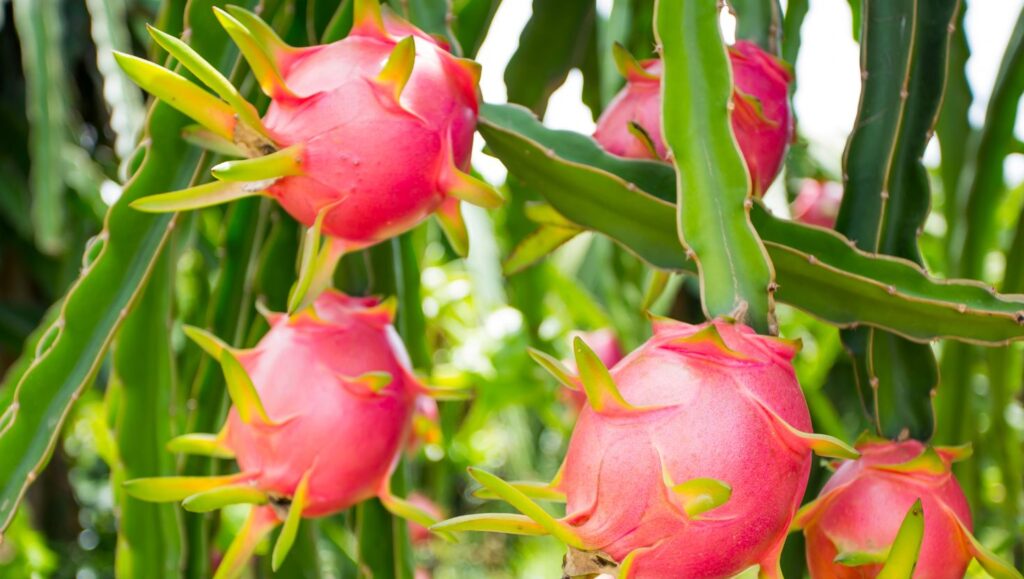
Optimal Growing Conditions for Successfully Cultivating Dragon Fruit
- Sunlight: Requires full sun to thrive, ensuring it receives ample light for healthy growth throughout its life cycle
- Soil: Thrives in well-drained, sandy soil enriched with organic matter to support root health and prevent rot
- Watering: Minimal; requires deep watering only during dry months, making it very low-maintenance and perfect for drought-prone areas
- Fertilizing: Light applications of organic fertilizer are recommended every 2 months to promote growth and fruiting
- Pruning: Regularly check growth to keep it in check and encourage upward climbing for optimal production
Best Dragon Fruit Varieties to Cultivate
- White-fleshed dragon fruit – Offers a mild, sweet flavor, perfect for fresh eating and enhancing fruit salads
- Red-fleshed dragon fruit – Known for its intense sweetness and high antioxidant content, making it a garden favorite for health enthusiasts
- Yellow dragon fruit – Smaller in size but exceptionally sweet, adding diversity and vibrancy to your garden landscape
Best Practices for Growing Dragon Fruit on a Pergola
- Provide a sturdy trellis or pergola support, as dragon fruit can become quite heavy and requires stability for healthy growth
- Be aware that flowers bloom at night and are typically pollinated by bats or moths, so timing is crucial for fruit set and yield
- Consider hand pollination to increase fruit yield, especially in areas with fewer natural pollinators to ensure successful harvests
Choosing the Perfect Fruiting Vine for Your Pergola
Each fruiting vine presents unique growth habits, weight requirements, and pruning needs. For instance, passionfruit is ideal for rapid coverage, while kiwi and grapes demand sturdier pergolas to support their vigorous growth. Meanwhile, dragon fruit offers a unique edible option with minimal water requirements, making it perfect for those eager to create a low-maintenance garden.
Are you ready to design the ideal pergola to support your fruiting vines?
Contact Pergolas Brisbane at (07) 3064 0661 for expert guidance on custom pergola design and installation tailored to meet the unique requirements of your garden and enhance your outdoor experience.
Best Fruiting Vines for a Pergola in Brisbane – Passionfruit, Kiwi & More
The Article: Fruiting Vines for Brisbane Pergolas: Passionfruit, Kiwi & More first appeared on https://writebuff.com
The Article Fruiting Vines for Brisbane Pergolas: Passionfruit, Kiwi & More Was Found On https://limitsofstrategy.com
The Article Fruiting Vines for Brisbane Pergolas: Explore Passionfruit & Kiwi First Appeared ON
: https://ad4sc.com


You’ve touched on a fascinating aspect of home gardening that resonates deeply with many homeowners, myself included. The idea of enhancing outdoor spaces with not only aesthetic beauty through flowering plants but also with the practicality and joy of growing fruiting vines is indeed a transformative one. Living in a subtropical climate, I can genuinely attest to the advantages of incorporating fruit vines into outdoor spaces.